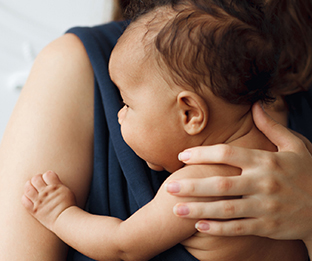Second-night syndrome: Why day two with your newborn can be the toughest

Once your baby is born, you’ll probably find the first 24 hours are quite straightforward. After meeting Mum and making their first attempts at breastfeeding, it’s likely your little bub will spend the next few hours catching up on some much-needed rest.
Known as the ‘recovery sleep,’ your bub will be out for the count over the next few hours, leaving you some time to sleep. The two of you have been through A LOT, so make the most of this opportunity.
The second night with a newborn, however, is a little different. Your baby has been in your cosy uterus for the last few months, and on the second day of life in the real world, they will realise that things are not the same, and they may protest – loudly.

Second-night dramas
Referred to colloquially as the ‘second-night syndrome,’ this is the time your baby is thought to recognise how much his life has changed. Their idyllic life in utero has been replaced with one that is bright, noisy and feels altogether different. The only thing that can ease their stress is being close to you.
Your baby will seek reassurance and comfort, usually in the form of a breastfeed and an extended cuddle. If this happens to you, you’ll notice that every time you try to put baby in their bassinet, they’ll wake up crying, which can be exhausting and stressful for you.
It’s normal – and it will pass
The second night with your baby might be a tough one, but it will be easier to deal with if you consider what your little one experiencing. Suddenly, all the things they were used to – the cosy confines of your womb, the regular beating of your heart, nourishment on tap and the steady gurgling of your intestines – have been removed, making baby feel unsure and unsettled. This is why they stop crying when you hold them close or offer another breastfeed, because it provides them with something that is familiar. In fact, snuggling into your chest is as close as bub can get to being back in utero.

Don’t panic
Try not to freak out if your baby doesn’t let you get any rest on the second night, and don’t think that the constant breastfeeding has anything to do with a low milk supply issue either. In fact, the more contact you and your baby have at the breast, the better signals your body will receive to make an abundant milk supply. Remember, this is just your baby’s way of settling into their new life outside of the womb, and it will take some time for them to adjust.
How to deal with it
If your baby settles in your arms or on your breast, let them snuggle and nurse there. If they fall asleep at the breast, gently unlatch them (by slipping a pinky finger into the corner of their mouth) and let bub snooze in your arms for a good 20 minutes before putting them in their bassinet or cot. This gives your baby a chance to slip into a deep enough sleep that they won’t stir the minute they’re put down (fingers crossed).
Once bub is in the bassinet, catch up on some rest yourself! You can also take turns with your partner holding your restless bub; they don’t really mind who holds them, as long as it’s someone with a warm, loving body. Physical contact is very powerful: offering your baby as much skin-to-skin contact will help keep them calm and allow the two of you to bond. Additionally, letting your baby find and suck on their own hands can help bub self-soothe while in your arms.
It might be a tough 24 hours mama, but it will pass, just like every other parenting challenge – and your baby will love you for hanging in there.









